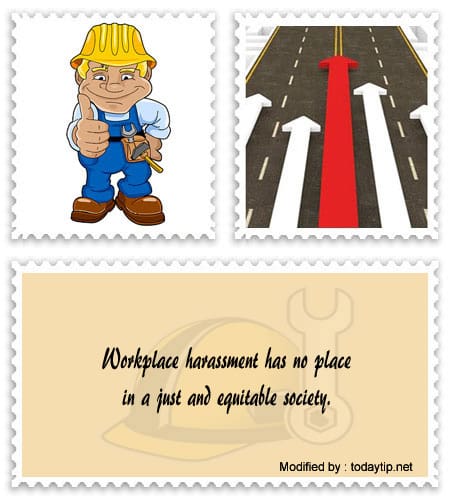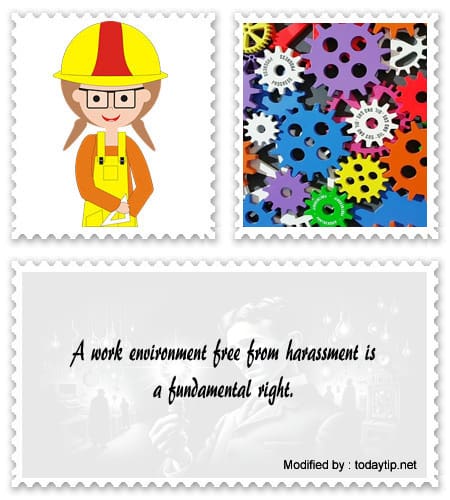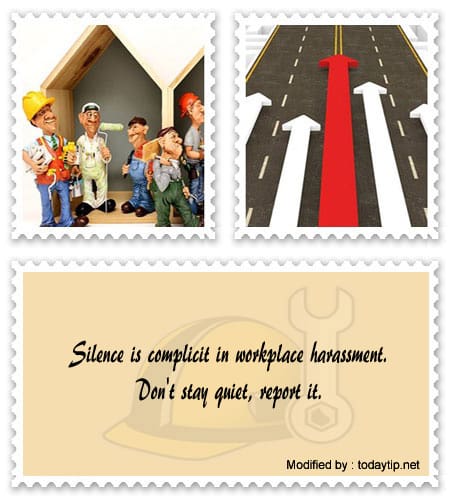Last modified 04/10/2025
Examples of voluntary resignation letters
How to write a voluntary resignation letter, how to draft a voluntary resignation letter, tips for writing a voluntary resignation letter?.
Resigning from a job is not easy, as it’s a very difficult decision to make due to the uncertainty about what the future holds.
Some people don’t do it because they prefer the security of a fixed salary, while others proceed to resign because they get tired of the same routine and look for something better.
#ResignationLetter #ResignationLetterTemplate
If you’ve made the decision to leave your current job, remember to end the employment relationship with your former employer on good terms.
Below we have some voluntary resignation letter templates for you that will ensure a smooth exit without tarnishing your professional image.
Reasons to voluntarily
resign from your job
There are various reasons why a person might decide to voluntarily resign from their job. Some of the most common are:
#VoluntaryResignationLetter #VoluntaryResignationLetterTemplates
1. Professional improvement:
* Lack of growth opportunities: If you feel there are no possibilities for promotion or professional development within the company, it may be a reason to look for new opportunities elsewhere.
* Lack of challenges: If your current job seems boring or unstimulating, and doesn’t allow you to use your skills and knowledge to their fullest, it may be time to look for a new challenge.
* Desire to change careers: If your professional interests and aspirations have changed, and your current job doesn’t align with them, it may be time to explore new professional areas.
2. Job dissatisfaction:
* Toxic work environment: If the work environment is toxic, hostile or makes you uncomfortable, it can negatively affect your well-being and motivation.
* Problems with boss or coworkers: Conflictual relationships with your boss or coworkers can generate considerable stress and affect your job performance.
* Lack of recognition or appreciation: If you don’t feel your work is valued or recognized by the company, it can be a source of demotivation and frustration.
* Excessive workload or stress: If your workload is excessive or you’re under constant stress, it can affect your physical and mental health, leading you to seek better work-life balance.
3. Personal reasons:
* Moving or change of residence: If you’re moving to another city or country for personal, family or health reasons, you’ll likely need to resign from your current job.
* Need to care for family members: If you need to dedicate more time to your children or sick relatives, you may need to resign to attend to their needs.
* Starting your own business: If you’ve decided to start your own business, you’ll need to resign from your current job to fully dedicate yourself to your new project.
* Pursuing studies or training: If you want to return to school or pursue additional training, you may need to resign to have more time available.
4. Other reasons:
* Insufficient salary or benefits: If you’re unsatisfied with your salary or the benefits the company offers, it may be a reason to look for a new job with better working conditions.
* Lack of work-life balance: If your current job demands too much time and prevents you from having a satisfying personal life, you may need to look for employment that offers better balance.
* Lack of ethics or values: If the company’s culture or practices don’t align with your ethical values, it may be a reason to resign and seek employment at a company that shares your principles.
It’s important to remember that the decision to resign from your job is personal and should be made carefully. Consider all factors involved, analyze your options and evaluate potential consequences before making a final decision.
Additional tips:
* Have a plan before resigning: Look for a new job before resigning from your current position. Make sure you have a financial plan to handle the transition period.
* Communicate your decision to your boss professionally: Inform your boss of your decision to resign with proper notice and in a professional, courteous manner.
* Maintain good relationships with coworkers: Express your gratitude to coworkers for their support and collaboration during your time at the company.
* Request recommendation letters: Ask your boss and/or coworkers for recommendation letters that may be useful in your job search.
I hope this information is helpful to you.
How to write
a voluntary resignation letter
Professional life is full of changes and transitions, and one of the most common is resigning from a job. If you’ve decided to leave your current job for personal or professional reasons, the voluntary resignation letter is the official document that will allow you to formalize your departure from the company.
In this article, we’ll guide you step-by-step in preparing an effective resignation letter, providing examples, tips and recommendations so your departure will be professional, cordial and memorable.
#VoluntaryResignationLetters #WorkplaceHarassment #VoluntaryResignation
Why is a resignation letter important?
Beyond being a legal requirement in some cases, the voluntary resignation letter serves several important purposes:
* Formalize your departure: It’s an official document that clearly and concisely communicates your decision to resign from your position at the company.
* Express gratitude: It allows you to thank the company for the experiences and knowledge gained during your time there.
* Maintain good relations: It helps you maintain a professional and positive image with your boss, coworkers and the company in general.
* Facilitate transition: You can offer to help facilitate the process of finding and selecting your replacement.
What elements should a resignation letter include?
An effective resignation letter should contain the following elements:
* Header: Date, sender information (name, position, department) and recipient information (immediate supervisor’s name, position, department).
* Introduction: Clearly and concisely express your intention to resign from your position.
* Body of the letter: Mention your last day, thank them for the opportunity, highlight some achievements or positive aspects of your experience (optional), offer to help with transition (optional).
* Closing: Say goodbye in a cordial and professional manner, include contact information (optional).
* Signature: Sign the letter by hand (if submitting a physical copy).
Example of a voluntary resignation letter:
Dear Mr./Ms. [Supervisor’s Last Name],
I am writing to inform you of my decision to voluntarily resign from my position as [Your Position] at [Company Name], which I have held since [Start Date]. My last day of work will be [Last Day], thus fulfilling the notice period established in my employment contract.
How to write an effective resignation letter?
* Be brief and concise: The letter shouldn’t be too long. Stick to the essentials.
* Be professional: Use formal and correct language.
* Be positive: Focus on the positive aspects of your experience at the company.
* Be honest: Don’t invent false reasons for your resignation.
* Review carefully: Before submitting the letter, check spelling and grammar.
Additional tips:
* Personalize the letter: Adapt the content to your specific situation and relationship with your boss and the company.
* Research the proper format: Some companies have specific formats for resignation letters. Check with Human Resources if necessary.
* Submit the letter on time: Comply with the notice period established in your employment contract.
* Maintain good communication: Inform your boss and coworkers about your decision to resign in a personal and professional manner.
* Express willingness to help: You can offer to help facilitate the job transition.
Conclusion:
Writing an effective voluntary resignation letter is an important step in your process of leaving the company.
By following the advice and recommendations in this article, you can formalize your farewell in a professional, cordial, and memorable manner, leaving a good impression and maintaining a positive relationship with your boss, coworkers, and the company as a whole.
Voluntary Resignation Letter Templates
1. Voluntary Resignation for a Better Job Opportunity
The decision to voluntarily resign from a job for a better job opportunity is common in the professional field. This formal resignation letter template is designed to maintain a positive work relationship with your current employer.
It includes gratitude for the experience and an adequate notice period, key elements for a successful professional transition. Use this format to communicate your decision in a professional and respectful manner, ensuring the door remains open for future collaborations.
[City and date]
To whom it may concern,
[Company name]
Through this letter, I communicate my voluntary resignation from the position of [position] at [company], effective as of [date]. This decision is due to a professional opportunity that aligns with my long-term goals.
I deeply appreciate the experience gained and the support received during my time at the company. I am available to facilitate the transition during this period.
Sincerely,
[Your full name]
[ID/Employee number]
Keywords: voluntary resignation, formal resignation letter, better job opportunity, resignation notice, positive work relationship, professional transition, gratitude to employer, resignation letter template, labor law, end of employment contract.
2. Voluntary Resignation for Personal Reasons
When personal reasons require leaving a job, it is crucial to draft a clear and professional resignation letter. This template helps communicate your decision without delving into private details, maintaining confidentiality and respect toward the company.
It includes phrases like “due to personal circumstances that require my attention” to justify your departure, along with gratitude for the opportunity. Ideal for those who need a concise yet formal document, complying with the legal requirements of resignation.
[Date]
[Manager’s name/Human Resources]
[Company]
I inform you of my decision to voluntarily resign from my position as [position] due to personal circumstances that require my immediate attention. My last working day will be [date].
I appreciate the opportunities provided during my tenure. I am available to coordinate the handover of responsibilities.
Best regards,
[Your name]
[Contact]
Keywords: resignation for personal reasons, clear resignation letter, workplace confidentiality, formal resignation template, resignation justification, legal resignation requirements, gratitude to the company, professional letter, worker’s rights, end of contract.
3. Voluntary Resignation Due to Relocation
A change of residence is a valid reason to submit a voluntary resignation. This letter template highlights the relocation as the main reason, avoiding speculation and maintaining a positive tone. It includes a 15 or 30-day notice period (depending on the contract) and expresses gratitude for the experience gained.
Perfect for employees who wish to formalize their departure without affecting their work history.
[City, date]
[Human Resources]
[Company]
Due to my **permanent relocation** to [new city], I submit my **formal resignation** from the position of [position], effective [date].
I appreciate the valuable experience gained. I am available to train my replacement if necessary.
Best regards,
[Signature]
[Your name]
Keywords: resignation due to relocation, change of residence for work, resignation notice, formal resignation letter, work letter template, professional experience, positive work history, labor law, business communication, end of employment relationship.
4. Voluntary Resignation Due to Health Reasons
If physical or mental health issues require you to resign, this template helps you draft a respectful and discreet letter. Use terms like “due to health reasons that require my immediate attention” to explain your decision without revealing medical details.
Include gratitude to the company and, if possible, offer a transition period. Ideal for preserving your professional reputation and leaving the door open for future opportunities.
[City, Date]
[To the HR Manager or Supervisor]
[Company Name]
[Address]
Subject: Communication of voluntary resignation
Dear [Name],
Through this letter, I communicate my decision to voluntarily resign from the position of [position] at [company], due to health reasons that require my immediate attention. My last working day will be [date, at least 15 days later].
I deeply appreciate the opportunities provided during my time at the organization. I am available to coordinate the transition of my responsibilities during this period.
Sincerely,
[Your full name]
[ID/Employee number]
[Contact phone number]
Keywords: resignation due to health, work-related health issues, discreet resignation letter, health resignation template, medical confidentiality, professional reputation, work transition, employee rights, formal business communication, voluntary termination.
5. Voluntary Resignation Due to Job Dissatisfaction
Job dissatisfaction (toxic environment, lack of growth) may lead to a voluntary resignation. This template avoids direct criticism and focuses on seeking new professional challenges.
Phrases like “I have decided to conclude my time at the company to explore new horizons” maintain a professional tone. Includes a standard notice period and thanks for the experience gained. Key for an elegant exit without burning bridges.
[Date]
[Manager’s Name]
[Company]
[City]
Dear [Name],
I hereby inform you of my decision to resign from my position as [job title] effective [date], to pursue new professional challenges aligned with my development goals.
I appreciate the opportunity to have been part of [company] and value the experience gained. During these remaining [weeks/months], I will collaborate in the necessary transition.
Sincerely,
[Your Name]
[Signature]
[Contact]
Keywords: resignation due to job dissatisfaction, toxic work environment, professional resignation letter, new work challenges, standard notice period, professional tone, burning work bridges, elegant resignation template, labor law, employment contract termination.
6. Voluntary Resignation to Start a Business
Are you leaving your job to start a business? This resignation letter highlights your entrepreneurial spirit as the reason for leaving, using motivational language while thanking the company.
Phrases like “I’m pursuing a personal dream of professional independence” convey positivity. Ideal for those seeking to formalize their departure without affecting future relationships.
[City, Date]
[Attention: HR Department]
[Company]
Subject: Voluntary resignation for entrepreneurial project
Dear [Team],
I formally communicate my resignation from the position of [job title] to dedicate myself to a personal business project. My last working day will be [date].
I appreciate the knowledge gained at [company], which will undoubtedly be fundamental for this new stage. I’m available to train my replacement.
Best regards,
[Your Name]
[Signature]
[Phone/Email]
Keywords: resignation to start a business, entrepreneur resignation letter, professional independence, formal resignation template, motivational language, formalize work departure, business relationships, labor law, contract termination, transition to own business.
7. Voluntary Resignation Due to Workplace Harassment
In cases of workplace harassment, this letter communicates your resignation without entering into conflictive details. Uses terms like “due to circumstances affecting my work wellbeing” and prioritizes your emotional health.
Includes the legal notice period but avoids direct accusations (save them for a labor lawsuit if necessary). Key to protect your worker rights.
[Location, Date]
[Human Resources]
[Company]
[Reference: Resignation Letter]
I hereby formalize my resignation from the position of [job title] due to circumstances affecting my work wellbeing, effective [date].
I request my employment certificate and corresponding documentation. Details of my situation have been documented in [attachment/case HR-XXX].
Sincerely,
[Your Name]
[ID Number]
[Copy to: lawyer if applicable]
Keywords: resignation due to workplace harassment, work wellbeing, emotional health at work, careful resignation letter, legal notice period, worker rights, labor lawsuit, formal resignation template, work conflict, employee legal protection.
8. Voluntary Resignation Without Specific Reason
If you prefer not to give explanations, this generic resignation template uses phrases like “for personal reasons” or “I’ve decided to terminate my contract”. Maintains a neutral and professional tone, complying with the contractual notice period. Ideal for those seeking simplicity and formality without elaborating on reasons.
[Date]
[Company]
Attn: HR
Subject: Voluntary resignation
I communicate that effective [date] I will cease providing services as [job title] at [company], for personal reasons.
I appreciate the opportunity given. I remain available for instructions regarding the exit process.
Regards,
[Your Name]
[Employee ID]
Keywords: resignation without specific reason, generic resignation letter, simple resignation template, contractual notice period, professional tone, work formality, labor law, employment contract termination, business communication, work relationships.
What is understood by workplace harassment?
Workplace harassment, also known as mobbing, is a situation where systematic psychological violence is exerted on a worker with the objective of destabilizing, humiliating, isolating or even forcing them to resign from their job.
Workplace harassment can manifest in various ways, including:
* Verbal aggression: Insults, threats, humiliation, disqualifications, shouting.
* Hostile behaviors: Intimidating looks, threatening gestures, social isolation, exclusion from group activities.
* Psychological harassment: Assignment of impossible or humiliating tasks, excessive control, work sabotage, creation of a hostile work environment.
* Discrimination: Based on race, gender, religion, age, sexual orientation, etc.
* Physical violence: Physical aggression, pushing, hitting.
Consequences for physical and mental health of the worker
* Stress: Anxiety, depression, panic attacks, insomnia.
* Low self-esteem: Insecurity, lack of self-confidence, personal devaluation.
* Concentration problems: Difficulty focusing at work, frequent mistakes.
* Decreased work performance: Low productivity, absenteeism.
* Physical health problems: Headaches, digestive issues, cardiovascular diseases.
* In extreme cases, workplace harassment can even lead to suicide.
If you are a victim of workplace harassment, it’s important to:
* Document everything that happens: Record dates, times, locations and details of harassment incidents. Save emails, text messages, audio or video recordings, and any other evidence you may have.
* Talk to someone you trust: You can speak with a friend, family member, coworker, union or mental health professional.
* Report the harassment: You can report the harassment to your boss, Human Resources, Labor Inspection or competent court.
* Seek professional help: A psychologist or therapist can help you deal with the consequences of workplace harassment and develop coping strategies.
Remember that workplace harassment is illegal and you shouldn’t tolerate it. You have the right to a safe and healthy work environment.
You’re not alone. There are people who can help you face workplace harassment and defend your rights.
Famous quotes about workplace harassment
Workplace harassment, also known as “mobbing”, is an unfortunate situation that affects thousands of workers worldwide. These famous quotes from various personalities reflect the seriousness of the problem, the importance of fighting against it and the search for a healthy and respectful work environment:
:: “Workplace harassment is cowardice. It’s a form of violence exerted on the most vulnerable people”. * Pope Francis
- This quote from Pope Francis highlights the cowardly nature of workplace harassment, focusing on the vulnerability of victims and the lack of courage from harassers.
:: “Workplace harassment is like a cancer that eats away from inside”. * Psychologist Pilar Rodríguez
- Psychologist Pilar Rodríguez uses a powerful metaphor to describe the devastating consequences of workplace harassment, comparing it to a disease that deeply affects people’s mental and emotional health.
:: “Silence is complicit in workplace harassment. Don’t stay quiet, report it”. * Campaign “No to Workplace Harassment”
- This quote from the “No to Workplace Harassment” campaign emphasizes the importance of breaking the silence and reporting harassment situations as a fundamental step to combat this problem and protect victims.
:: “Workplace harassment isn’t an individual problem, it’s a problem for all society”. * Labor relations expert Juan Carlos Valladares
- Expert Juan Carlos Valladares broadens the perspective of workplace harassment, recognizing it as a social problem that requires a collective approach for its eradication.
:: “A work environment free from harassment is a fundamental right”. * International Labor Organization (ILO)
- The ILO, as a leading international labor organization, recognizes workers’ fundamental right to a harassment-free work environment.
:: “Workplace harassment has no place in a just and equitable society”. * Human rights activist Lorena Fuentes
- Activist Lorena Fuentes emphasizes that workplace harassment is incompatible with a society based on justice and equity, where all individuals deserve respect and dignity.
:: “Fighting workplace harassment is fighting for people’s dignity”. * Unified Central Workers Union (SCUT)
- The SCUT, as a union organization, highlights the fight against workplace harassment as a fight for people’s dignity and defense of their fundamental rights.
:: “Workplace harassment doesn’t define you, what defines you is your courage to face it”. * Psychologist Ana López
- Psychologist Ana López offers an empowering message to victims of workplace harassment, reminding them that their worth isn’t defined by harassers’ actions, but by their strength and determination to face the situation.
:: “Together we can build a work world free from harassment and violence”. * Campaign “United Against Workplace Harassment”
- This quote from the “United Against Workplace Harassment” campaign invites unity and collaboration to build a healthier, safer and more respectful work environment for all.
:: “Workplace harassment isn’t just a work problem, it’s a life problem”. * Anonymous workplace harassment victim
- An anonymous testimony highlights how workplace harassment repercussions go beyond the work environment, also affecting personal life and victims’ overall wellbeing.
Remember you’re not alone. If you’re a victim of workplace harassment, there are people and organizations that can help you. Don’t hesitate to report and seek support to face this situation.
After reading the various voluntary resignation letter templates, you’ll have noticed that people who make this decision do so by highlighting the positive characteristics of the company they’re leaving while thanking them for the opportunity to work there.
In conclusion, an excellent style to leave a company is by expressing appreciation for the opportunity that was once offered to us.
Related posts :
01: Best countries for Architects
02: Download lawyers professional profile & goals
03: Download resume profile samples
04: Examples of voluntary resignation letters
05: How to define effective professional objectives for your resume
06: How to find a job in Montreal
07: How to work in Dubai as a Doctor
08: How to obtain a work visa for Doctors in Dubai
09: Job opportunities for Engineers in Dubai
10: Memo letter templates for employees to download
11: Professional goals for Architects
12: Salary increase request letter templates
13: Sample warning letters for an employee
14: The highest paid Engineers in Canada
15: Working in Dubai as an Architect
16: What is the american citizenship exam like?
Image credits:
Original image of voluntary resignation letter, courtesy of “Pixabay.com“. Modified by datosgratis.net
If you liked this page you can support us by sharing it on Facebook, Instagram, Twitter, WhatsApp. Also if you wish you can collaborate with this portal by sending your original voluntary resignation letters which will be published for other internet users like you, they will thank you.








